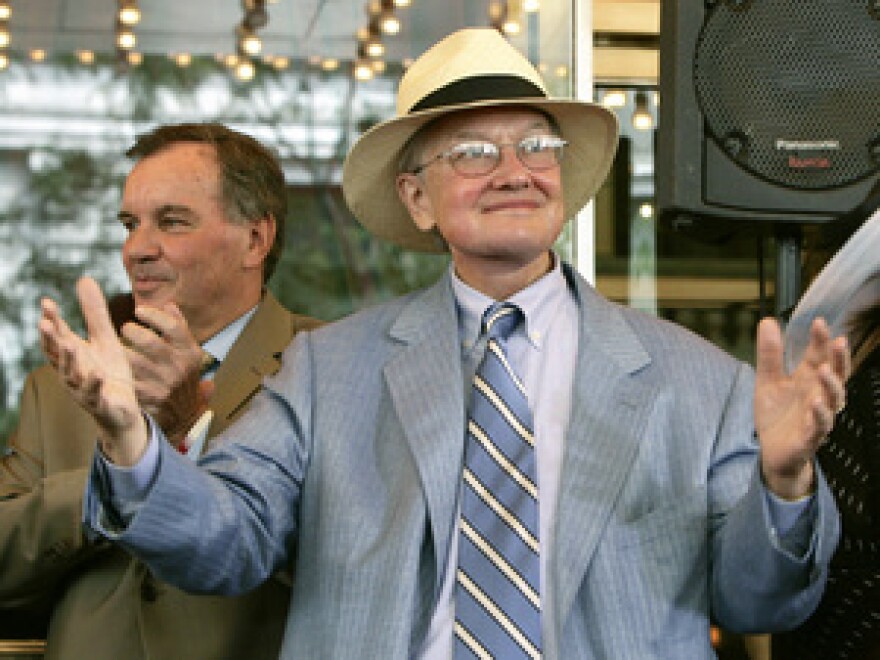Roger Ebert, the nation's best-known film reviewer who with fellow critic Gene Siskel created the template for succinct thumbs-up or thumbs-down movie reviews, died Thursday. He was 70.
The news came just two days after Ebert announced he will be writing fewer of his famed movie reviews because of a recurrence of cancer.

The Pulitzer Prize winner announced on his blog this week that he was undergoing radiation treatment for cancer that was discovered after he fractured his hip last year, and therefore would be taking a "leave of presence."
"It means I am not going away," Ebert, 70, wrote in a blog post late Tuesday. "I'll be able at last to do what I've always fantasized about doing: reviewing only the movies I want to review."
Battle with cancer
Ebert had been wrestling with cancer for years. Over his life, he was treated for salivary gland cancer, thyroid cancer and cancer of the jawbone. Ebert lost his jaw and his ability to talk, but he still kept up an unrelenting pace, reviewing more than 200 movies a year for the paper and keeping up an admired digital presence.
When he first lost the ability to eat or drink, Roger Ebert became obsessed by tastes and smells, and found himself daydreaming about a frosty mug of root beer. (Listen to the audio below.)
Early days
Ebert was born June 18, 1942. By the time he was 15, he was covering high school sports for his local paper in Champaign-Urbana, Ill. He went on to become a stringer for the Chicago Sun-Times, and when the paper's film critic left, he was offered the job.

"My mother's friends never knew what I did," he recalled. " 'And how is Roger?' They would have sons who were lawyers, doctors. 'And how is Roger? Is he still just going to the movies?' "
Ebert was 24, one of a crop of young critics around the country hired to cover the edgy films being made during the late '60s — movies like The Graduate, Easy Rider and Bonnie and Clyde. While writing reviews, Ebert also got some firsthand experience in the movie business, writing screenplays for B-movie king Russ Meyer. Ebert wrote the script for Beyond the Valley of the Dolls and, under a pseudonym, Beneath the Valley of the Ultra-Vixens.
In 1975, Ebert became the first film critic ever to receive the Pulitzer Prize for Criticism. Although his movie reviews were syndicated, it was his television work that took the heavyset, bespectacled Ebert to a national audience. In 1978, a three-year-old local film-review show he hosted with his chief Chicago rival, the Tribune's Gene Siskel, was picked up for syndication by PBS.

"What Roger brought to the show was a very clear vision of what he was trying to communicate to viewers," says TheaFlaum, the show's executive producer. "Not worried about how he appeared. Only worried about getting across what he wanted you, sitting at home watching him, to know. And that's an enormous strength — maybe it's the essence of what a great critic really is, and I think that's what made the show fly."

The show continued after Siskel's death from a brain tumor in 1999, with Ebert eventually joined by Richard Roeper. At the height of his career, Ebert wrote as many as 300 reviews a year, published books, and covered the Academy Awards and the major film festivals every year as a working journalist — all this in addition to the show. He also programmed his own film event — Roger Ebert's Overlooked Film Festival, featuring movies he considered great but ignored.
Ebert not only communicated enthusiasm for mainstream movies but championed singular projects like the small documentary Gates of Heaven. The film, about pet cemeteries, made it onto Ebert's 10-best list one year. Its director, a then-unknown Errol Morris, says if not for Ebert, he might not have had a career. Ebert's encouragement about that first directorial effort made an enormous difference for Morris.
"Here I had someone writing about my work who was a true enthusiast," Morris says. "His enthusiasm has kept me going over the years, and the memory of his enthusiasm will keep me going for as long as I make movies."

'A guy who could joke about himself'
For all of Ebert's influence, his trademarked right thumb also brought charges that he was doing a disservice to serious film criticism. Morris says that's not true.
"It tells you he was a guy who could joke about himself, and if the 'thumbs up' and 'thumbs down' deal in any way suggests to people this was a person who did not take movies seriously, they are just wrong," he says.
In addition to winning the Pulitzer, Ebert was the first critic to have a star on Hollywood's Walk of Fame. During a 2005 interview with NPR, he encouraged audiences to push themselves beyond Hollywood.
"If you only see films about people just like yourself, why even bother to go? Because you already know about yourself," he said. "You can only find out about yourself by learning about others."






